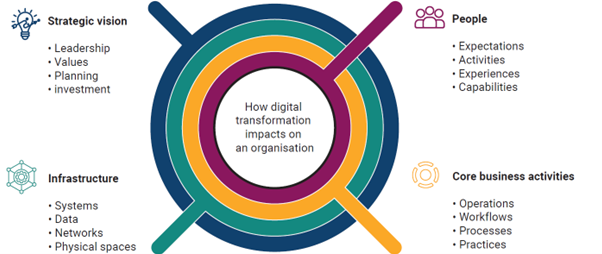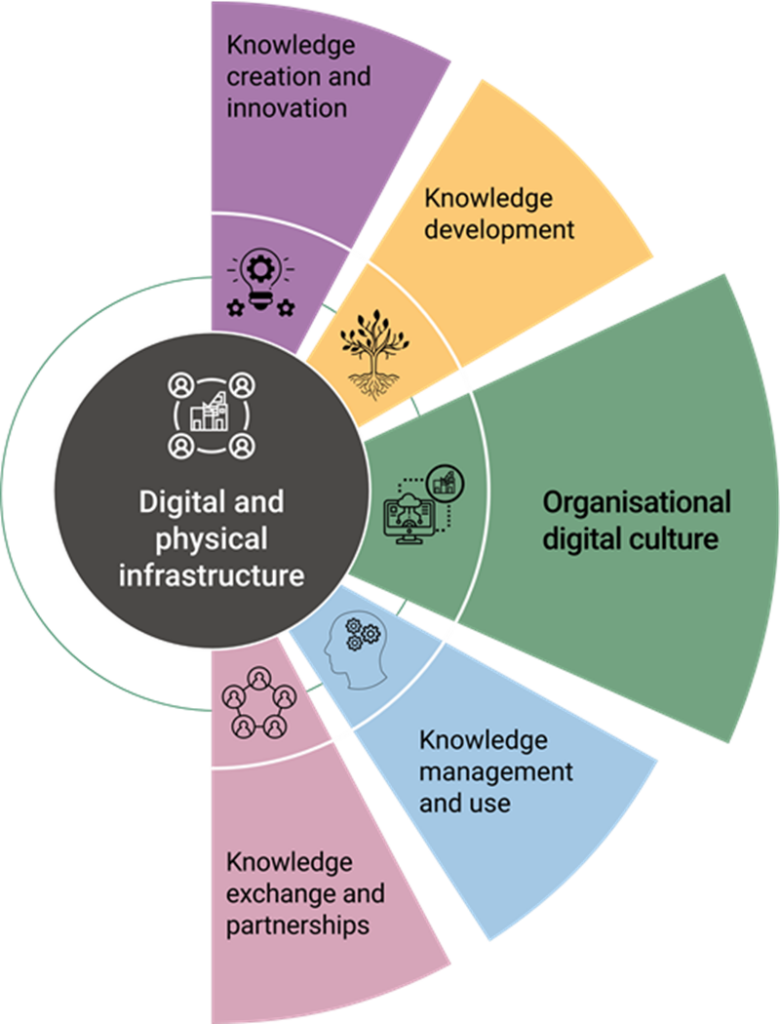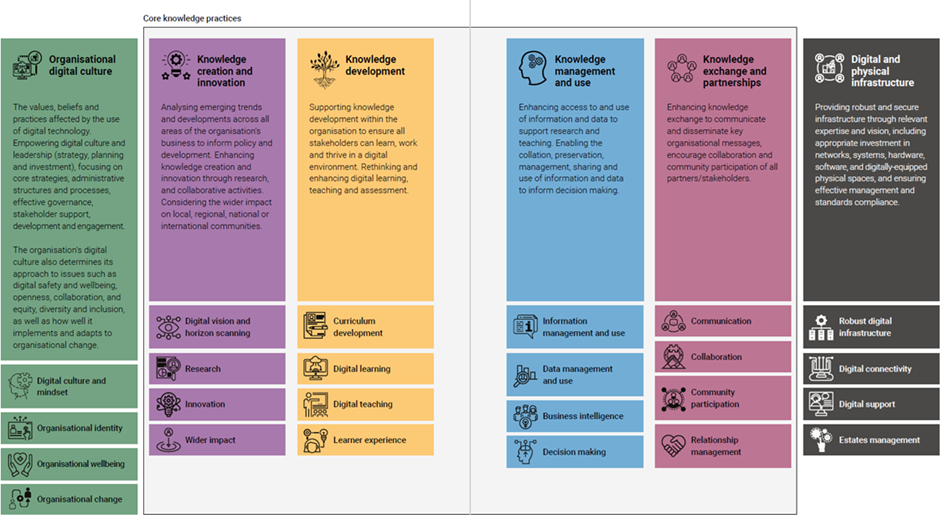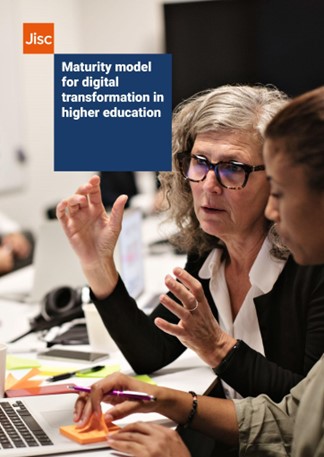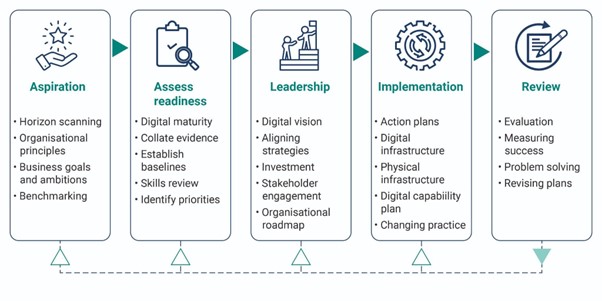This #Take5 is brought to you from Sarah Knight at Jisc. We asked Sarah to write to us Learning Developers about the recent developments – and especially the current emphasis on digital transformation and how Jisc is working with universities to support them with the development of their digital strategies.
Jisc is the UK digital, data and technology agency focused on tertiary education, research and innovation. Jisc is a not-for-profit organisation and provides managed and brokered products and services, enhanced with expertise and intelligence to provide sector leadership and enable digital transformation. Jisc runs the Janet network, the UK’s national research and education network, licences a wide range of digital resources, collections and software, develops advice and guidance, supports a range of communities with the sharing of practice including all the Jiscmail lists.
Who I am and what I do!
I am Sarah Knight, head of learning and teaching transformation working in the higher education and research directorate at Jisc. I have worked at Jisc for 20 years and managed a wide portfolio of projects and research. Over the past year I have been working with my team to support higher education providers with taking forward their digital transformation agenda.
Many of us will say, this is what we have been doing over the past 20 years, why the emphasis now on digital transformation and what do we mean by this term?
UK universities are facing significant disruption due to the economic crisis with diminishing resources, changing student demographics along with the impact of COVID-19 on staff and student wellbeing. One of the ways the sector is responding to challenges and disruption is by revisiting their strategies for digital.
Earlier this year, our report, Digital strategies in UK higher education: making digital mainstream, found that more and more universities consider technology as ubiquitous. Many are weaving digital strategies into overall institutional strategies, so technology is no longer an optional bolt-on, but an integral part of university business. Digital is now so vital, some leaders have noted that, if organisations still need to write a digital strategy, they should make it their last.
How do we define digital transformation?
Successful digital transformation focuses on people and practices and requires effective digital leadership, appropriate investment, robust secure infrastructure, stakeholder engagement, digitally capable staff and students, uniform data practices and, perhaps most crucially, a cultural shift towards digital adoption. The infographic below shows how digital transformation impacts on all aspects of a university.
Digital transformation impact infographic: a diagram illustrating how digital transformation impacts on an organisation.
- Top left: Strategic vision – leadership, values, planning, investment
- Top right: People – expectations, activities, experiences, capabilities
- Bottom left: Infrastructure – systems, data, networks, physical spaces
- Bottom right: Core business activities – operations, workflows, processes, practices
How are we supporting higher education with digital transformation?
The complexities and scale of higher education providers (HEPs) present challenges to achieving ambitious digital strategies. Using the Educause definition of digital transformation[1], we have been working with UK higher education to co-develop a framework and maturity model for digital transformation for senior leaders, managers and those with responsibility for supporting digital transformation. Academic and educational developers play a key role in enabling digital transformation in their universities.
“Digital transformation is a series of deep and coordinated culture, workforce, and technology shifts that enable new educational and operating models and transform an institution’s business model, strategic directions, and value proposition.”
Brown et al. Digital Transformation Signals: Is Your Institution on the Journey? Enterprise Connections (blog), EDUCAUSE Review, May 12, 2020.
To create these resources, we worked with a 300-strong working group of senior leaders, as well as a host of sector bodies: Universities UK, Advance HE, UCISA, the Association of Higher Education Professionals (AHEP) the Association for Learning Technology, the Association of University Directors of Estates (AUDE), SCONUL, and Vitae.
Universities now have access to a framework for digital transformation in higher education, a digital maturity model, and a comprehensive transformation guide.
The framework offers a structure to guide the development of strategic vision and planning, fostering innovation, streamlining business processes and operations, and developing partnerships for collaboration. The maturity model supports higher education with baselining local digital developments and enables sector benchmarking.
Digital maturity model
Our new digital maturity model will enable universities to identify their baselines on digital transformation against sector benchmarks and gives them the tools and insights to make the necessary progress in relevant areas.
To complement this, we have also produced an action plan and roadmap template for institutions to use, identifying actions, KPIs (key performance indicators), investment, responsible owners, relevant stakeholders, supporting resources and documents, and to assign priority levels to activities. This can be used to help inform the development of an actionable digital transformation strategy, or review and adjust existing strategies.
Digital transformation in higher education guide
Our digital transformation guide shares how universities can review and implement digital transformation across their organisations, comprehensively covering all aspects of university operations, from the digital and physical infrastructure to effective digital leadership, organisational culture.
A diagram illustrating the steps to digital transformation.
- Aspiration: horizon scanning, organisational principles, business goals and ambitions, benchmarking
- Assess readiness: digital maturity, collate evidence, establish baselines, skills review, identify priorities
- Leadership: digital vision, aligning strategies, investment, stakeholder engagement, organisational roadmap
- Implementation: action plans, digital infrastructure, physical infrastructure, digital capability plan, changing practice
- Review: evaluation, measuring success, problem solving, revising plans
We are looking forward to working with universities as they pilot these resources in their own organisational contexts over the next year. We will be sharing the approaches used to assess digital readiness and the lessons learnt on how to drive digital transformation over the next year.
And importantly: If you are interested in following these developments please join our digital transformation working group.
Biography
Sarah Knight is head of learning and teaching transformation within the higher education and research directorate at Jisc and is supporting universities with their digital transformation. Sarah established the Jisc student experience experts group, an active community which provides valuable consultation and dissemination opportunities for Jisc. Sarah continues to champion Jisc’s change agents’ network: to support staff-student partnership working on technology enhanced curriculum projects. During her time at Jisc, Sarah has led large transformation projects on curriculum design, digital capabilities and learners’ experiences of technology.
[1] Brown et al. Digital Transformation Signals: Is Your Institution on the Journey? Enterprise Connections (blog), EDUCAUSE Review, May 12, 2020.

